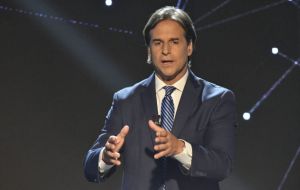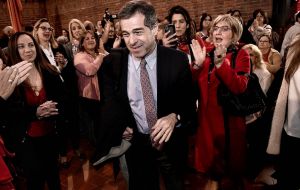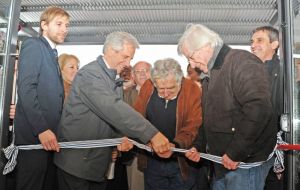MercoPress. South Atlantic News Agency
Uruguayan election: “a ponies race, no thoroughbreds competing”
 Daniel Martinez, the incumbent candidate, and Luis Lacalle Pou in October 1st presidential TV debate.
Daniel Martinez, the incumbent candidate, and Luis Lacalle Pou in October 1st presidential TV debate.  Lacalle Pou, the opposition's main contender
Lacalle Pou, the opposition's main contender  Ernesto Talvi, trying to resurrect the Colorado party
Ernesto Talvi, trying to resurrect the Colorado party  Former Army chief General Guido Manini Rios, the great surprise
Former Army chief General Guido Manini Rios, the great surprise  Danilo Astori, Jose Mujica and Tabare Vazquez down from the front stagee
Danilo Astori, Jose Mujica and Tabare Vazquez down from the front stagee On Sunday 27 October the Uruguayan electorate will be voting for a new president (there is no immediate reelection) and a renewed Legislative, 30 Senators and 99 Lower House members. Uruguay is one of the more stable countries in the region, both it's solid institutions as well as its citizens who are deeply committed to democracy, social rights and a strong presence of government in the economy.
And after fifteen years of rule by the Broad Front, a catch all coalition whose arch extends from radical groups, some of them still believing in violence and Marxist class struggle, to Christian Democrats, and with a clear majority in parliament, capricious at times, Uruguayans seem ready for a change or at least a more balanced Legislative, meaning whoever wins will have to work out an understanding with other groupings to have legislation passed.
This is what apparently public opinion polls are showing and the feeling in the streets. Despite having achieved an impressive social legislation record, abortion, LTBG rights, national health scheme, cannabis industry development, there are other areas extremely unfulfilled such as law and order because of rampant criminality, education, once the emblem of Uruguay's democracy is in tatters, lack of jobs since the tail winds have silenced and the economy has slowed down under the burden of a budget deficit of 5% of GDP, while the investment grade from credit rating agencies remains in suspense until a new administration emerges and displays its plans for the next five years. Not to forget the free hand granted to the trade unions under the Communist party, a natural ally of the Broad Front coalition. In effect the concept of striking for labor conditions extends to occupying working places, as long as needed, ignoring basic rights as private property.
In international policy, the Broad Front has aligned Uruguay with countries that ignore human rights, Venezuela, Cuba, Nicaragua, or with regimes that have shown to have authoritarian inclinations or are victims of rampant corruption, such as the big neighbors, The insistent support of the “legitimate” government of Nicolas Maduro, “because he won the elections”, in global forae, is so shocking and hilarious at the same time that opposition lawmakers blame it on the close trade and money links between the Venezuelan regime popes and members of the Broad Front, including the family of president Tabare Vazquez, and stalwart-bodyguards of ex president Jose Mujica who profited handsomely from acting as intermediaries in government to government business deals, on payment of which Venezuela defaulted. In effect, dairy, poultry, rice farmers among others are owed millions of dollars by Venezuelan contractors.
Likewise when it comes to managing government, employees payroll has jumped from 230.000 to 310.000 in fifteen years, particularly during Mujica's five years, (2010/15); pensions on medical grounds climbed to some 40,000 far from any rational percentage in similar systems. There is no excuse, Uruguay's civil wars ended over a century ago. To have an idea of the magnitude of these numbers it must be pointed out that the Uruguayan working force is estimated in some 1.8 million and the contributor/pensioner ratio stands at 2.59, and as in the rest of the world unsustainable in a few years.
With this scenario and the fifteen years of commodities bonanza over with a return to normal prices, except for beef, pork and poultry because of the African Swine Disease in China, the Uruguayan electorate is looking for a change while at the same time, the main political forces are in the process of renewing leaders and a new crop of political parties or ambitions is emerging ensuring that as explained above the legislative will be very much atomized and in much need of understandings to function.
Some twelve to fifteen presidential hopefuls are competing, but in reality four/five really count. The first obviously is the incumbent, Daniel Martinez, an engineer who has spent most of his life working for government or government contractors, and was a union leader. He belongs to the Socialist party, was once elected senator, later named Minister of Industry and in July 2015 elected mayor of Montevideo. But his outstanding performance has been as head of Uruguay's largest company, the oil refinery, fuel distribution and cement production ANCAP, which together with his successor in the chair, Mujica's scion and political heir apparent; Raul Sendic managed to bankrupt it, and needing almost a billion US dollars in capitalization to recover it. The magnitude of the disaster can be compared to what happened in Brazil with Petrobras. The Brazilian company with an annual turnover of some US$ 90bn was skimmed off almost US$ 3bn, and to be honest the audit continues, while ANCAP with a turnover of US$ 6bn, needed a capitalization of a billion dollars.
Engineer Martinez is a dull character and poor debater with none of the academic or down to earth flair of his two predecessors, Tabare Vazquez and Jose Mujica. In spite of a tight result in the primary, he ignored the Mujica sponsored candidate, Carolina Cosse and the Communist union leader Oscar Andrade, and picked an relatively unknown lady, apparently radical, Graciela Villar, who in her first statements called for the elimination of the Army, splitting and distributing farms among landless peasants and an urban reform limiting the number of homes to one per family. Obviously she has been gagged and in open rallies limits herself to applaud the candidate and dance.
The main opposition contender is Luis Lacalle Pou, the son of a former president, belonging to a prominent political family in Uruguay. He is a lawyer, 46 and this is the second time he is running for president, having managed to clear the primary with over half the votes cast. His private sector experience is limited, but has been in politics since a teenager, and has been elected lawmaker several times. He belongs to the National Party, which together with the Colorado party are considered among the oldest political parties in the world having come to light in the 1830ies, after Uruguay's first constitution was implemented as an independent country. Lacalle Pou is the candidate most likely to make it to the presidential runoff, most probably with Martinez, but he will need to be more folksy and less classy if he wants to have the presidential sash on his chest next March first.
His running mate is Beatriz Argimon, a notary with a long political experience and was chosen precisely to indicate that the conservative national party has become very much gender conscious.
Another hopeful is Ernesto Talvi, an economist, World Bank consultant, first generation Uruguayan, his father fled from the ruins of central Europe after WW2, who does not have much political experience. However Talvi picked the glove of the Colorado party, which has been losing ground despite having been for almost a century and a half the most important political force of the country. Talvi meritoriously defeated in the primary by a wide margin, Julio Maria Sanguinetti (1985/90 and 1995/2000) twice elected president and a political reference of the country.
As did Martinez, Talvi did not pick any of his primary competitors for the ticket, and turned to Robert Silva, an expert in education and labor issues, who will be running for vice president. Talvi has made education and the economy the main battlegrounds of his campaign, but after defeating Sanguinetti, a true feat, he turned back to his Chicago university academic reflections, (which are not of the taste of his electorate), demeaning government employees and speaking wonders about Chile, which as a member of OECD, might be an economic success, but figures quite low when it comes to social and education ratings.
Finally a total newcomer to the field, both as a party and as a candidate. Cabildo Abierto or Open Assembly, and its presidential hopeful, the former chief of the Uruguayan Army sacked for speaking too much in demand of his troops and requesting an end to the trials for the alleged crimes committed by officers during the military dictatorship that was over in 1984. General Guido Manini Rios has emerged as a caudillo for the Uruguayan military family, but also for the conservatives contrary to the Broad Front and the soft response to current affairs from the opposition parties. His realm of attraction also extends to many from all the Uruguayan arch disappointed when not fed up with politics, the lack of law and order and what is described as the loss of traditional values. The General complains that Uruguay has become a mess (relajo) and many law and order abiding citizens believe him...and trust him. Manini Rios, also a traditional name in Uruguayan politics most probably won't make it to the runoff, but he will certainly conquer two, maybe three seats in the Senate of thirty. Not a bad choice for the Uruguayan conservatives that want to send a strong message to the overall political system.
Thus interesting times ahead for Uruguay, the Broad Front three main leaders, Tabare Vazquez, Jose Mujica and Danilo Astori, have moved aside. Something similar has happened in the National and Colorado traditional or historic parties, and an array of small parties, contrary to Uruguay's well established political system have emerged with chances of probably pinching one or maybe two Senate seats.
As ex president Jorge Batlle liked to comment, “it's going to be a ponies race, no thoroughbreds”, meaning that not only ponies are short but also unpredictable and mostly ill tempered.
Although there are plenty of opinion polls released every week in Uruguay, the latest experience with the primaries at the end of June, indicates caution. This is because polls are no longer done the traditional way, knocking on doors. This has become very difficult in Uruguay, the well off won't open or answer the door bell and in the less fortunate homes similarly; besides several of the country's slums in urban peripheries have become no go areas. Collecting info randomly from cellular phones or social networks does not ensure sufficient scientific consistency.




Top Comments
Disclaimer & comment rules-

Read all commentsGreat article. Anyone involved in the “Latin Americanist” business and in financial markets should read it.
Oct 08th, 2019 - 10:31 am +1Commenting for this story is now closed.
If you have a Facebook account, become a fan and comment on our Facebook Page!